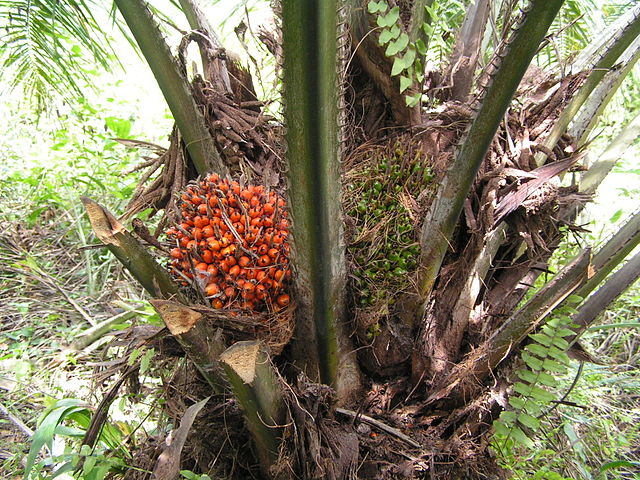
Is palm oil bad? It depends. It is bad in terms of health and environmental costs, but it is good because it has more oil than other crops and provides an income for people who would otherwise be living in poverty.
What is palm oil? It is made from the fruit of the African oil palm. The fruit grows in bunches and each fruit is about the size of a small kiwi. When they are ripe, the farmer cuts them down with a saw pole with a saw on one end. Each bunch of fruit weighs about 25 kg. The fruit is collected and transported to a mill where they are sterilized first. The sterilized fruit goes through a thresher to remove the stalks and all the other bits, before the fruit goes to the press to be squeezed. The resulting oil is collected and transported away for use.
This is a difficult question because it is not black and white. Nothing is completely good or completely bad. Let’s break it down and look at the question in sections. Let’s look at it health wise, environmentally, and economically.
Is palm oil bad for our health? Yes and no. It is a good source of vitamin E, which our immune systems need. The specific type of vitamin E found in palm oil is connected to protecting brain tissue and can halt the progression of some brain injuries. It is a great source of antioxidants, which we also need. It can help the body absorb more vitamin A as well. However, it is an oil so it has saturated fats, which can affect cholesterol. Studies have shown that palm oil is not as healthy as olive oil or vegetable oils, but it is healthier than shortening or butter. One problem with palm oil is that it is heavily used in ultra processed foods and when it is, most of the good things in it are distilled out. Natural palm oil can actually go off if it is left, so UPF companies distill out all of the things that could make it go bad, which are all of the things that make it healthy.
Is palm oil bad for the environment? This is another yes and no question. Palm oil is currently responsible for a lot of deforestation. Palm is used in foods, but it is also used in things like soaps, shampoos, and detergents. Half of all of the products we buy have palm oil in them. This makes it a very lucrative crop. It grows in hot countries and a lot of farmers in those places are very eager to plant palm oil trees. However, in order to do this, they have to make space, which means cutting down the forests that are already there. Palm oil plantations are currently spreading across Asia, Africa, and Central America. The WWF says that between 2004 and 2017, 257,000 square kilometers of forest were cut down to make room for palm oil trees. That is about the size of the UK. So, is palm oil bad for the environment? Yes, in the respect of deforestation, but palm oil is only responsible for 2.3% of global deforestation. And, palm oil is far better for the environment than other oils. The palm oil fruit is about 30% oil, which is far higher than all other crops that are used to make oil. If we stopped buying palm oil, we would have to buy the next alternative, which is probably oil from soy, and that is far less productive. 1 hectare or palm oil trees makes 4.4 tons of oil and 1 hectare of soy make about half a ton of oil. If we stopped buying palm oil, we would have to plant a lot more soy, so, in that respect, it is not as bad for the environment as other crops.
Is palm oil bad for the world economically. Well, apart from the fact that a lot of it is bought and used by enormous multinational conglomerates, palm oil can raise people in poor countries out of poverty. Palm oil is very profitable and it is a good source of income for many people. However, as with anything that is bought and sold by multinational companies, there are many different levels here. In the same way as coffee or chocolate, some farmers get paid a pittance and still live below the poverty line. Other, better, companies use sustainable, fair trade palm oil and pay a decent price for it. In the end, that comes down to us. Are we willing to pay more for healthy, fair trade products? Some people have that luxury, but many don’t. And the multinational companies know that. And this is what I learned today.
Image By Bongoman – Own work, CC BY-SA 3.0, https://commons.wikimedia.org/w/index.php?curid=3799202
Sources
https://www.webmd.com/diet/palm-oil-health-benefits
https://www.realsimple.com/food-recipes/shopping-storing/food/what-is-palm-oil
https://www.health.harvard.edu/staying-healthy/by-the-way-doctor-is-palm-oil-good-for-you
https://www.worldwildlife.org/industries/palm-oil
https://en.wikipedia.org/wiki/List_of_countries_and_dependencies_by_area
